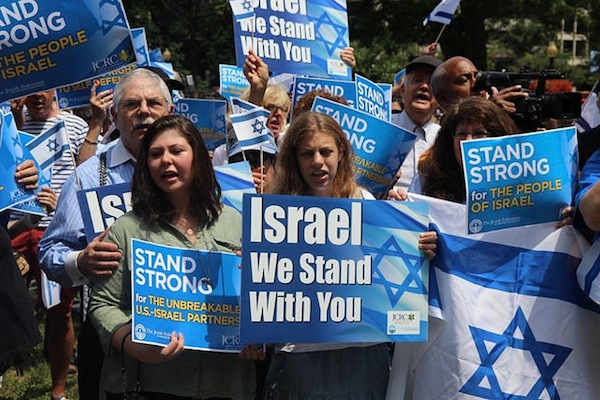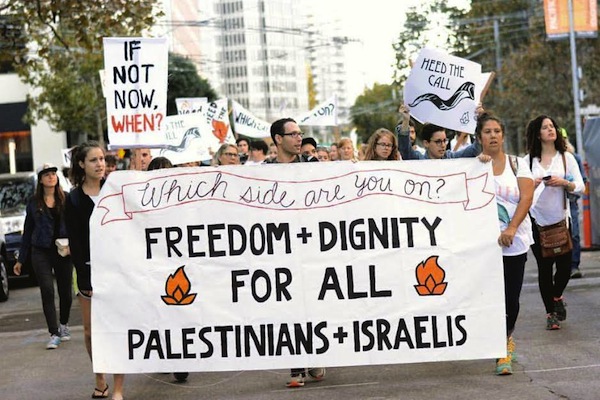Growing up, I found that the Conservative movement embraced nuanced approaches to Torah, yet that critical approach never extended to discussions of Israel. Questioning Zionism was verboten.
By Eliana Fishman

It was the summer before eighth grade at Camp Ramah in the Berkshires, a Jewish summer camp affiliated with the Conservative Movement. I was 12 years old. Each camper was handed a copy of Mitchell Bard’s Myths and Facts, long considered a foundational hasbara textbook, and we were told that the author would be coming to speak to us.
Most campers ignored the book and didn’t pay much attention to Bard’s presentation. One particularly precocious camper, who actually read through the book, took the time to highlight misleading arguments and logical inconsistencies, and challenged the author during his lecture. Bard made light of the critiques and brushed them aside, insisting that every accusation against Israel was rooted in anti-Semitism, and that there was no way human rights violations had anything to do with Palestinian discontent.
No Palestinians — and not even a liberal Zionist — were ever invited to speak. By inviting Bard to talk without challenge or counterpoint, Camp Ramah in the Berkshires effectively taught us that the occupation was an anti-Semitic myth.
I grew up at the intersection of the Modern Orthodox and Conservative Jewish communities of New York City. Five days a week, I attended an Orthodox day school, where we learned that the Torah came from God, and that any inconsistency in the text can be explained by ruach hakodesh, prophetic foresight. On Shabbat, at my family’s Conservative-affiliated minyan, or prayer community, Jewish academics shared divrei torah, literally words of Torah, suggesting that the Book of Esther was a Judaization of the fertility myths of Ishtar and Marduk. They sketched out models for understanding inconsistencies in the Torah as proof of a multiplicity of biblical authors, and different eras of the text’s construction. Learning non-traditional interpretations as a child strengthened my relationship to Torah, and ensured that critical approaches to text do not threaten my religious practice.

While the Conservative movement embraced nuanced Talmud Torah, that approach never extended to discussions of Israel. The blind support for Israel found in Conservative movement spaces, on the other hand, is reminiscent of a far more Orthodoxy approach to Torah study and Jewish thought.
No one within the Conservative movement ever discussed the rabbinic texts that oppose the Jewish people’s return to the Land of Israel. Questioning Zionism was verboten. And no one knew, and still, to this day no one knows what the occupation looks like.
In May, I joined the Center for Jewish Nonviolence for a week of Palestinian solidarity work in the West Bank. Since returning, I have been discussing my experiences with some of my parents’ Conservative friends — the same friends who visit Israel annually, send their children on year-long trips there, comfortably speak Hebrew, and identify as liberal Zionists. Friends who compare various South Jerusalem synagogues and minyanim and read the latest Hebrew novels, but have never visited the Educational Bookstore, a prominent East Jerusalem landmark covered in floor-to-ceiling bookshelves with novels and political analyses by Palestinian, Israeli, Jordanian, and Egyptian writers.

I told them about how Israeli forces prevented a group of American Jews from going on a Breaking the Silence tour of Hebron while allowing a right-wing delegation to pass unhindered. I told them about a settler drone that came and took aerial photos of a Palestinian village. I told them about the complex systems of laws, military orders, and arbitrary decisions that comprise the daily nightmare that is life under occupation. They were dumbfounded. Because they don’t know, and they don’t want to learn. Their love for Israel requires them to ignore the occupation.
I won’t ignore the occupation, just like I reject simplistic interpretations of Torah.
My relationship to Torah is stronger because it is simultaneously a divine text, a primary source, a work of literature, an ethics manual, and the cornerstone of my people’s canon. My gratitude is to those teachers and commentators who were not afraid that presenting their own textual and theological doubts would somehow delegitimize Torah, demonize God, or hold Jewish narratives to a double standard.
If only Camp Ramah had the same confidence and was willing to tell their campers about the human rights abuses and unequal “justice” systems in the West Bank, and about the resource disparities between East and West Jerusalem. That honesty could have led a generation of Conservative Jews to trust what their religious institutions say about Israel. Instead, my generation knows that whatever the Conservative movement says about Israel is likely misleading, and missing a significant chunk of the story.
Eliana Fishman is a graduate student at Columbia University studying Quantitative Methods in the Social Sciences. This piece is a part of IfNotNow’s #YouNeverToldMe campaign. For more information, visit younevertoldme.org
